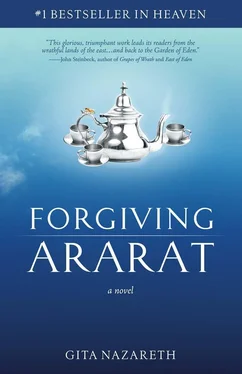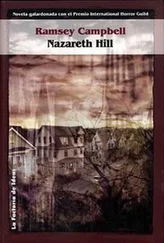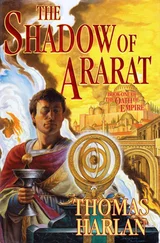“In his teenage years,” Haissem went on, “Toby’s unrequited longing and love for his father turned into hatred of the man who had never once written a letter to let them know he was still alive-or to ask if they were still alive. At his most violent moments, Toby fantasized about meeting his father on a street, introducing himself as his son, and pulling a revolver from a pocket and shooting him dead between the eyes; at other moments, when the possibilities of the future seemed expansive and bright, Toby imagined becoming a great success and one day being stopped on the street by his father as a beggar and shoving him aside without recognition or pity. There were few times in Toby Bowles’ life when he did not feel the pain of his father’s abandonment; but his sister Sheila became the beneficiary of this broken relationship, receiving the love Toby would have given his father; she desperately needed such a champion because her mother blamed Sheila for all that had gone so terribly wrong. When the time came, Ester Bowles gladly handed Sheila over to the state as though she were handing over a carrier of typhus or a common criminal. Ester Bowles lived in a gloom from which she rarely ascended, replacing her need for a husband by suffocating Toby with jealous affection. Toby became as protective of Sheila as he was of his own daughters; he would have gladly gone to jail or bankrupted himself to win her escape from the asylum, and he nearly did both. All the extra money he raised by stealing and selling supplies in the Army went to Sheila, not for his own use-not even to feed and clothe his own young children.
“The only other photograph in Sheila’s room, next to her bed, was taken by the director of the home on the day Toby brought her a terrier puppy she named Jack that went to heaven a year later when it crossed the road. Arm in arm, Sheila and Toby stand grinning for the photograph with the furry bundle-proud sister and wealthy businessman from the big city (for who else, she thought, could afford such an extravagant gift?).
“Sheila Bowles died in her sleep one year before Toby’s affair with Bonnie Campbell began; Toby buried her on a brutal February morning in a small cemetery near the house by the lake, not far from the tiny wooden cross with the word ‘Jack’ carved into its surface by her hands. In a voice breaking with grief and love across the wind-swept knoll, Toby handed his sister over to her Creator, and he told her Creator, his family, and the few mourners from the house, that the earth would never again be graced by such innocence.”
“But God heard none of this!” I protested to Haissem. “The moment of truth arrives for Toby Bowles, but his life unspools bad to good instead of good to bad and he’s hurled into hell without appeal…without a trace? What kind of God would conduct such a trial?”
“A just God,” Luas said. “The God of the Flood. Haissem presented the case through Mr. Bowles’ own thoughts and actions. Could any of it be denied?”
“No,” I conceded, “but only his sins were presented.”
“Then only his sins were relevant,” Luas answered, irritated by my challenge. “It was the Judge who ended the presentation. Who are we to weigh the gravity of Toby Bowles’ offenses and determine what is just and unjust? I warned you not to speculate.”
“I think it’s good that Brek wants to hear Toby’s story,” Haissem interjected. “Understanding the mistakes and triumphs of his life may help her when she enters the Chamber on behalf of her first client.” He turned to me. “There’s more. Would you like to hear the rest?”
Luas wasn’t willing to let it drop. “My point wasn’t that Toby’s story is irrelevant,” he said. “I only meant to say that justice is God’s, not ours, and that justice will be done.”
“I understand, Luas,” Haissem said curtly. “And my point is that justice has nothing to do with it at all.”
Luas regarded Haissem suspiciously. “Then I respectfully disagree,” he said.
Haissem ignored the comment and turned back to me. “Let me finish the story,” he said. “You haven’t even heard the most important part yet. You see, the truth is that Toby Bowles touched the lives of many people. To avoid a court martial for stealing the medical supplies in Saverne, he volunteered for a combat unit. Out of eight men assigned to that unit, all but Toby were shot dead or drowned in the Elbe River on the final push of the Allies to Berlin. Toby, himself, was hit in the leg while carrying his wounded sergeant up the river bank. He limped away, bleeding and stunned, and collapsed outside a small cabin in the woods near Kamenz. When he awakened, he found himself inside this cabin, feverish from an infection, surrounded by the family who lived there: a father, mother, teenage daughter, and two younger sons. They gave him food and water and he slept another twenty-four hours until he awoke again, this time to the sound of gunfire and screaming as the mother and children fled into a tunnel beneath the floorboards of the cabin and the father ran from the house with a shotgun.
“Toby hobbled along after the man to help, and they came to the edge of a clearing where they could see a very large house through the misty afternoon rain. They kneeled behind some bushes and watched as a platoon of soldiers with red stars on their sleeves drove the inhabitants from the house and out into the driveway: an elderly man, two middle aged women, a teenage girl, two younger boys, and two younger girls, all dressed in party clothes. The leader of the platoon barked an order in Russian and the old man and the young boys were separated from the others and shot on the spot. When the women lunged toward the victims, they too were cut down in cold blood. It all appeared to Toby as in a dream, through the fine mist, distorted by fever from the infection, bodies dropping like shadows into darkness, continuing the savage nightmare begun earlier along the banks of the Elbe River. The man from the cabin, still kneeling beside Toby, jumped up and charged the platoon, firing his shotgun wildly into the air. The platoon returned the fire, killing him instantly.
“Toby started limping back toward the cabin before realizing he had been seen and would be leading the soldiers to the man’s family. To save them, he changed direction and confronted the soldiers, knowing that in all likelihood he would be killed. He put his hands over his head and limped through the clearing, yelling ‘American! American!’ The grass was wet and the water soaked through his pants, stinging his wounds. All the while he was thinking not of himself, but of his sister Sheila and who would care for her now, of his mother and how news of his death would plunge her deeper into despair, of his father and how news of his death might haunt him with regret for the rest of his life.
“Two Russian soldiers came forward with their guns raised, but as they neared Toby and saw his uniform, they lowered their weapons. ‘Amerika! Amerika!’ they cheered, embracing him. Then the soldiers saw the cabin in the distance and advanced toward it. Toby knew the only hope for the family was for him to convince the soldiers that he had already taken them prisoner. He limped along behind the soldiers as fast as he could; when they got to the door, he slid past them, pulled out his sidearm, and motioned for them to stand back. One of the soldiers grabbed the pistol from Toby’s hands, but Toby pushed the door open, yanked up the floorboards and ordered the frightened family out of the tunnel. They were white and shaking with fear; they glared at Toby for having been betrayed after they had saved his life. Toby pointed at them and then himself and said to the soldiers: ‘My prisoners! My prisoners!’ He grabbed the mother and slammed her against the wall, then the daughter and the two boys. He pointed to a medal on one of the Russian’s chests and then his own chest, where a new medal would be placed if he brought them in.
Читать дальше












